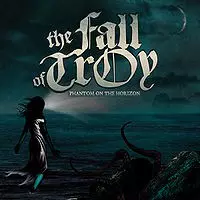The convenience and cost-mindedness of Cup Noodles has allured me for years. Considering it routinely costs a dollar, the flavor can't be beat. You get a hearty amount of those delicious noodles, but they really get their flavor from the sprinkles of spices and the broth created by the contents of a simple whistling kettle.
Though hard to characterize as "cheap," the Fall of Troy's earlier material was very much like that food product. You were presented with plenty of noodles, but enough flavor that the combination was a powerful one.
Hey, dudes in Fall of Troy -- I think you need to pour a little more boiling water into Phantom on the Horizon.
The roots of this five-chapter/track, 38-minute album lie in The Ghostship Demos, a mystical EP the Fall of Troy recorded in 2004 but never properly released. Fans flocked to the leaked songs, which were complex and ambitious, incorporating instruments unusual for the band, but the EP managed to retain a stark and melancholic yet dynamic nature. The band planned to re-record them as part of a greater concept album, but as tour obligations and plans to track their next proper studio album (2005's Doppelgänger) got in the way, they never quite got around to it. (However, one song from Ghostship, "Macaulay McCulkin," did re-appear on Doppelgänger.) In fact, one more studio album followed (2007's Manipulator) before the band finally found some time to properly lay it down in mid-2008 with Casey Bates producing.
And then, Phantom on the Horizon was complete. The band pressed it onto a limited number of CDs -- 3000 or so -- and released it that following November; the pressing quickly sold out, but it lives on today in the digital realm.
These songs have gone drastic makeovers since their original respective appearances on Ghostship. The recording is obviously much better and the ideas are fleshed out, but as Horizon's complexities unravel through its course, the moments provided don't seem quite as engaging as the angular nuggets that made Doppelgänger and Manipulator so tasty. Granted, on paper its concept seems pretty interesting -- a Spanish galleon meeting with a ghost ship from another dimension.
The band's been dogged with Mars Volta comparisons since their inception, but nowhere is it more warranted than here. Thomas Erak's voice is more operatic than ever, scaling summits he hasn't often visited, while plenty of riffs seem mesmerizing in jagged, spacey or wandering ways. In fact, you could probably say Horizon is about as interesting as a mid-era Mars Volta album -- something that's certain to stir up debate.
If Horizon ever suffers, it's because of the very noodliness of a base the band's been building upon for years. Here, it's just not built on enough, nor is there enough emotion to give the songs a human touch. "Chapter I: Introverting Dimensions" is an 11-minute, multi-part symphony that unfolds interestingly enough, but like here and the more succinct "Chapter II: A Strange Conversation," the band's trademark transitions to
frantic bursts come off less exciting and jarring than the old stuff. They've lost the unpredictability that made their screams so piercing and the fretboard work of riffs so air guitar-worthy -- granted, you're still likely to find your head involuntarily twitching and fingers plucking away at nothing.
If nothing else, Horizon has a great atmosphere about it, and newcomer bassist Frank Black holds it down well on his debut, his lower-end backup growl adding a nice element to things. (Otherwise, it's like you wouldn't even know former b-man Tim Ward left the band.) But the Fall of Troy may need reminding that they were ironically more epic in raw three-minute bursts than they are in marathons double the time here.
STREAM
Chapter II: A Strange Conversation
